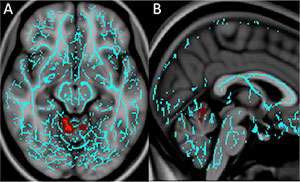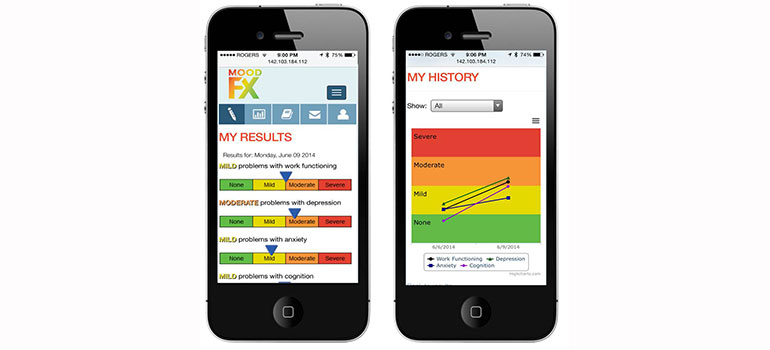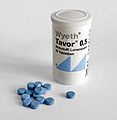Questioning Aswers: "This is the first study to identify the existence of sensory subtypes among older children and adolescents with ASD [autism spectrum disorder] and explore their association with anxiety levels."
Far be it from me to question the above quote provided in the paper by Mirko Uljarević and colleagues
[1] but I'm inclined to suggest that there has already been some
research published on the link between sensory issues and anxiety in the
context of the autism spectrum before. Indeed, I do wonder whether the assertions put forward by Mazurek and colleagues [2] on how gastrointestinal (GI) issues (yes, they are over-represented) might
be an important part of any sensory/anxiety mix in autism could be
something that is further looked at by Uljarević in their cohort?
Only good, independent and reliable information about health from experts.
Showing posts with label anxiety disorders. Show all posts
Showing posts with label anxiety disorders. Show all posts
Saturday, November 5, 2016
We shouldn’t worry so much about our kids’ anxiety – it’s a normal part of growing up
 TheConversation: There’s been a big rise in the number of young people seeking
help for their anxieties, according to Childline. The telephone
counselling service has suggested exposure to social media reports on global issues such as Brexit and the war in Syria may be behind the 35% increase in the number of calls it receives from anxious children. Yet while some may see this as further evidence of a wider mental health crisis
among young people, it’s important to remember that worrying is a
normal part of life. Kids usually learn to cope with worries as they
grow up, but worrying can also enhance problem-solving skills in children.
TheConversation: There’s been a big rise in the number of young people seeking
help for their anxieties, according to Childline. The telephone
counselling service has suggested exposure to social media reports on global issues such as Brexit and the war in Syria may be behind the 35% increase in the number of calls it receives from anxious children. Yet while some may see this as further evidence of a wider mental health crisis
among young people, it’s important to remember that worrying is a
normal part of life. Kids usually learn to cope with worries as they
grow up, but worrying can also enhance problem-solving skills in children.
Friday, November 4, 2016
Worried but well, may boost chance of a sick heart
Scimex: People who worry about having or developing a serious illness may be
raising their risk of developing heart disease, according to a team of
Norwegian scientists. The researchers surveyed over 7,000 older people's
levels of anxiety about their health and found that those who had
health anxiety were twice as likely develop heart disease as those who
didn't have health anxiety - 6 per cent compared to 3 per cent. Although
this study can't prove that health anxiety causes heart disease, the
authors say that there is still a need for the proper diagnosis and
treatment of health anxiety.
Tuesday, June 23, 2015
Being a 'couch potato' linked to increased anxiety risk
NHS: “Being a couch potato is bad for your mental health,” the Mail Online reports. However, the evidence gathered by a new review is not as clear-cut as the headline would lead you to believe.
The review summarised the results of nine studies on the link between anxiety symptoms and sedentary behaviour, such as using a computer or watching TV. Overall, five of the nine studies found a positive link – that as time spent sitting went up, so did the risk of anxiety symptoms. However, the results of a review are only as reliable as the studies it includes, and in this case they weren’t very good. The majority of studies looked at sitting and anxiety at one time.
The review summarised the results of nine studies on the link between anxiety symptoms and sedentary behaviour, such as using a computer or watching TV. Overall, five of the nine studies found a positive link – that as time spent sitting went up, so did the risk of anxiety symptoms. However, the results of a review are only as reliable as the studies it includes, and in this case they weren’t very good. The majority of studies looked at sitting and anxiety at one time.
Friday, June 19, 2015
First review to examine the relationship between sedentary behaviour and anxiety
Scimex: The first systematic review to examine the relationship between
sedentary behaviour and anxiety has found that prolonged sitting, such
as watching TV, working on a computer or playing electronic games, is
linked to increased risk of anxiety in adults and children. The study was published today in the open access journal BMC Public Health.
Exploring anxiety and ritualistic behaviour
Scimex: A research team, including a New Zealander, has gained fresh insight
into the characteristics of the ritualised behaviour. The scientists
looked at the actions people took when cleaning, and found that
increasing stress and anxiety led to more repetitive and predictable
cleaning behaviour. They hope that the research will help to understand
the ritualistic traits seen in religious ceremonies, gamblers, athletes,
or people with conditions such as obsessive-compulsive disorder or
autism.
Tuesday, June 16, 2015
Brain Injury Patterns Linked to Post-concussion Depression and Anxiety
RSNA: A new MRI study has found distinct injury patterns in the brains of
people with concussion-related depression and anxiety, according to a
new study published online in the journal Radiology. The findings may lead the way to improved treatment and understanding of these common disorders, researchers said.
Post-concussion psychiatric disorders like depression, anxiety and irritability can be extremely disabling for those among the nearly 3.8 million people in the United States who suffer concussions every year. The mechanisms underlying these changes after concussion—also known as mild traumatic brain injury—are not sufficiently understood, and conventional MRI results in most of these patients are normal.
Post-concussion psychiatric disorders like depression, anxiety and irritability can be extremely disabling for those among the nearly 3.8 million people in the United States who suffer concussions every year. The mechanisms underlying these changes after concussion—also known as mild traumatic brain injury—are not sufficiently understood, and conventional MRI results in most of these patients are normal.
Monday, June 15, 2015
Seven new genes linked to anxiety disorders
TheConversation: Researchers have linked seven new genes to anxiety disorders such as
obsessive compulsive disorder, panic disorder and social anxiety
disorder. These gene links mean that new drug treatments could be created to
target these gene products specifically in the treatment of anxiety
disorders. It gives hope to thousands of people who currently have no
treatment plan. Treatments for anxiety disorders involve both drug-free and drug-based therapies. The most effective treatment strategies are a combination of the two, differing in application from patient to patient.
Wednesday, June 10, 2015
Study links brain inflammation triggered by chronic pain to anxiety and depression
Irvine: Brain inflammation caused by chronic nerve pain alters activity in
regions that regulate mood and motivation, suggesting for the first time
that a direct biophysical link exists between long-term pain and the
depression, anxiety and substance abuse seen in more than half of these
patients, UC Irvine and UCLA researchers report. This breakthrough finding also points to new approaches for treating
chronic pain, which is second only to bipolar disorder among
illness-related causes of suicide. About a quarter of Americans suffer
from chronic pain, making it the most common form of enduring illness
for those under the age of 60. The Institute of Medicine estimates that
this costs our society more than $635 billion per year.
Monday, June 8, 2015
Smoking increases panic attacks
Maastricht: Panic disorder patients run a greater risk of
experiencing panic attacks if they smoke regularly. This was shown in a
doctoral research study performed by Inge Knuts of Maastricht UMC+.
Based on the study findings, she recommends combining panic disorder
treatment with treatment for tobacco dependence. People
with panic disorder suffer from frequent and unexpected panic attacks.
Recurrent panic attacks can easily result in sufferers avoiding
situations or circumstances in which they might experience a panic
attack. This fear of having a panic attack and the associated avoidance
behaviour can pose huge drawbacks with respect to their everyday lives.
Monday, June 1, 2015
Mobile mood-tracking website helps patients across Canada
British Columbia: Effective help for depression and anxiety is now just a click away, thanks to a mobile-optimized website developed at UBC’s Mood Disorders Clinic.
MoodFx, accessible by mobile device or computer, uses validated
questionnaires to track patients’ mood, cognition and work performance. While other mood-tracking websites and apps do exist, MoodFx, the
brainchild of UBC Mood Disorders Centre director Dr. Raymond Lam, is
unique. Not only was it developed by mental-health researchers and
clinicians, but its checklists and questionnaires are backed by
scientific research.
Sunday, May 31, 2015
Germanwings prompts pilot review but industry must also deal with workplace stress
TheConversation: Following the tragedy of Germanwings flight 4U9525, the US Federal Aviation Administration has said it is launching a study into how pilots' mental health is monitored. It follows on from Lufthansa’s announcement of spot checks, much like dope testing in sport. The deliberate downing of the flight in March 2015 by co-pilot
Andreas Lubitz led to 150 deaths and prompted calls for safeguards such
as a requirement for two people to be present in the cockpit at all
times and greater sophistication in the screening of pilots. However, this tragedy also highlighted the potential dangers of
precarious employment contracts and the anxiety such contracts can
cause. Murder-suicide is a rare and extreme act,
but there was much speculation about Lubitz’s mental health and what
may have led or exacerbated his situation.
Friday, May 29, 2015
High finance, high anxiety
Ann Arbor: Studying events like the 2008 financial crisis in hindsight leads many to ask, "How could they have gotten it so wrong?" New research by University of Michigan professor Martin Schmalz finds
that overconfidence—underestimating risks—can be a rational response to
fear, or "anxiety," but the balance between the two can fluctuate over
time. "So many CFOs were overconfident before the financial crisis and
underestimated risk. That's quite puzzing" said Schmalz, assistant
professor of finance at U-M's Ross School of Business. "Given they are
the experts, why were they still so bad at it?"
Thursday, May 21, 2015
Animals’ presence may ease social anxiety in kids with autism
 NIH: When animals are present, children with autism spectrum disorders
(ASDs) have lower readings on a device that detects anxiety and other
forms of social arousal when interacting with their peers. According to a study funded in part by the National
Institutes of Health, companion animals — like dogs, cats or the guinea
pigs in the study — may prove to be a helpful addition to treatment
programs designed to help children with ASDs improve their social
skills and interactions with other people.
NIH: When animals are present, children with autism spectrum disorders
(ASDs) have lower readings on a device that detects anxiety and other
forms of social arousal when interacting with their peers. According to a study funded in part by the National
Institutes of Health, companion animals — like dogs, cats or the guinea
pigs in the study — may prove to be a helpful addition to treatment
programs designed to help children with ASDs improve their social
skills and interactions with other people.
Friday, April 17, 2015
Children encouraged to be fearless, not anxious
University of Queensland researchers are seeking families of anxious
children to participate in a ground-breaking intervention called
Fear-less. Professor Matthew Sanders from the School of Psychology
said an anxious child could suffer from problems with low self-esteem,
social isolation, academic difficulties and an increased risk of
psychiatric disorders. The founder of the world-renowned Triple P (Positive Parenting Program) said he was specifically seeking children aged seven to 12.
Thursday, April 2, 2015
Effectivenes of drugs for anxiety disorders overestimated
Oregon: A new analysis reported in JAMA Psychiatry raises serious
questions about the increasingly common use of second-generation
antidepressant drugs to treat anxiety disorders. It concludes that studies supporting the value of these medications
for that purpose have been distorted by publication bias, outcome
reporting bias and “spin.” Even though they may still play a role in
treating these disorders, the effectiveness of the drugs has been
overestimated.
Wednesday, March 25, 2015
Air pollution linked to stroke and anxiety
Scimex: Two studies have found that air
pollution is linked to a higher risk of stroke and associated with
anxiety. In one study, Scottish scientists reviewed research
investigating links between short term air pollution exposure and
stroke-related hospital admissions and deaths in 28 countries -
including Australia and New Zealand. While n the second study, US
researchers looked at air pollution and anxiety in over 70,000
women aged between 57 and 85 years.
Tuesday, March 3, 2015
Anxious people more apt to make bad decisions amid uncertainty
Berkeley University. US: Highly anxious people have more trouble deciding how best to handle
life’s uncertainties. They may even catastrophize, interpreting, say, a
lovers’ tiff as a doomed relationship or a workplace change as a career
threat.
Friday, February 20, 2015
Morita therapy for anxiety disorders in adults
Cochrane: Anxiety disorders are some of the most prevalent mental disorders. Morita therapy, a systematic psychological therapy
based on eastern philosophy, has been used to treat anxiety disorders
for decades. It encourages people with anxiety disorders to accept
anxiety as a natural feeling, while at the same time it engages them in
constructive behaviours via four phases, which sequentially are bed rest
in isolation, light work, heavy work and preparation for normal daily
living. Acceptance is merely redirecting attention towards purposeful
behaviour.
Thursday, February 19, 2015
Cognitive behavioural therapy for anxiety in children and young people
Cochrane: Many
children and young people suffer from anxiety. Children and young
people with anxiety are more likely to have difficulty with friendships,
family life and school. Treatments for children and young people with
anxiety can help to prevent them from developing mental health problems
or drug and alcohol misuse in later life.
Subscribe to:
Posts (Atom)














